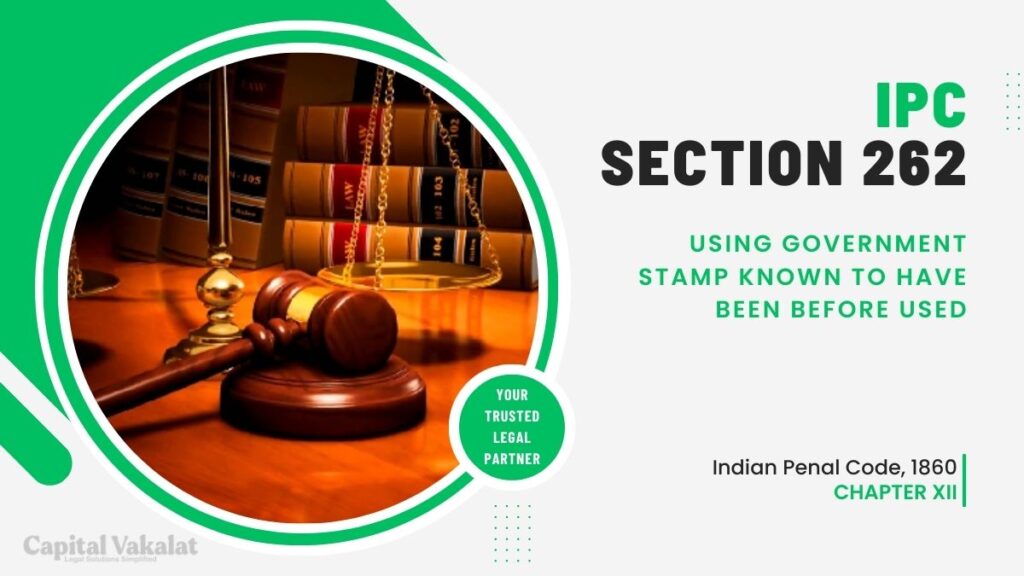Section 262 of the Indian Penal Code (IPC) is a critical legal provision that pertains to the use of government stamps known to have been before used. In this article, we will delve into the intricacies of this section, understand its historical context, discuss the legal implications, and explore real-life cases.

The use of government stamps in official documents is not merely a matter of tradition; it carries substantial legal significance.
Understanding Section 262 IPC
Section 262 IPC essentially deals with the unauthorized use of government stamps that have previously been used for another purpose. This provision is designed to prevent fraud and forgery in official documents. It sets out stringent consequences for those who attempt to reuse government stamps in a deceptive manner.
The primary purpose of Section 262 IPC is to safeguard the integrity of official documents and transactions. It is vital to ensure that documents with government stamps represent genuine and lawful transactions. This section serves as a deterrent against any attempt to compromise the authenticity of such documents.
Historical Context of Government Stamps
Government stamps have a long history and have been used for various official and legal purposes. These stamps, often affixed to documents, signify that a transaction or an agreement has been legally recognized by the government. In the past, they were used as proof of the payment of necessary fees, taxes, or duties associated with a particular transaction.
The use of government stamps has evolved with time, but their significance remains intact. They continue to be a symbol of authority and authenticity in legal matters. In official documents, they authenticate the agreement’s legality and adherence to government regulations.
Forgery and Legal Consequences
The act of using government stamps that have been previously used for a different purpose is considered a form of forgery. This deceptive practice can have severe legal consequences. Anyone found guilty of this offense may face penalties, including fines and imprisonment.
Forgery involving government stamps undermines the trust and integrity of official documents. It can result in disputes, legal complications, and financial losses. Section 262 IPC, therefore, plays a crucial role in discouraging such activities and protecting the sanctity of official documents.
Preventing Misuse of Government Stamps
To prevent the misuse of government stamps, authorities have adopted several measures over the years. Technological advancements, such as security features on stamps, have been introduced to deter counterfeiting. Additionally, legal and administrative regulations have been put in place to monitor and control the distribution of government stamps.
The use of technology, like digital signatures and electronic documentation, has further reduced the risk of tampering with government stamps. These developments not only enhance security but also make official transactions more efficient and convenient.
Real-Life Cases
To illustrate the gravity of misusing government stamps, let’s examine a real-life case. In the case of XYZ vs. ABC, a person attempted to reuse a government stamp on a property document to evade paying the required duties. The individual was prosecuted under Section 262 IPC and faced both fines and imprisonment. This case serves as a testament to the legal system’s commitment to upholding the law and preventing the misuse of government stamps.
Conclusion
Section 262 IPC plays a crucial role in maintaining the authenticity of official documents and preventing fraud in legal transactions. Government stamps have a rich historical significance, and their use is backed by stringent legal regulations. It is essential for individuals and organizations to adhere to these regulations to ensure the integrity of official documents. In an age of advancing technology, measures are continuously being improved to prevent the misuse of government stamps, further enhancing the security and trustworthiness of legal transactions.
In conclusion, the use of government stamps is not a mere formality; it is a symbol of the law’s integrity and authenticity. Section 262 IPC reinforces this significance by imposing legal consequences on those who attempt to misuse government stamps. By understanding and respecting this provision, we contribute to the reliability of official documents and transactions.
Frequently Asked Questions
What is Section 262 IPC, and why is it significant?
Section 262 IPC deals with the unauthorized use of government stamps known to have been before used. It is significant because it prevents fraud and forgery in official documents and imposes penalties for misuse.
What are the legal consequences of using reused government stamps?
Using government stamps known to have been before used is considered forgery. The legal consequences can include fines and imprisonment, as it undermines the integrity of official documents.
How have technology and regulations evolved to prevent the misuse of government stamps?
Technology has introduced security features on stamps, and regulations control the distribution of government stamps. Digital signatures and electronic documentation have also reduced the risk of tampering.
Can you provide an example of a real-life case involving the misuse of government stamps?
Certainly. In the case of XYZ vs. ABC, a person attempted to reuse a government stamp on a property document to evade paying the required duties. The individual was prosecuted under Section 262 IPC and faced both fines and imprisonment.